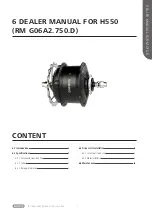
4
Take care that the glow plug clip or battery leads do not come into contact with the propeller.
Also check the linkage to the throttle arm. A disconnected linkage could also foul the propeller.
After starting the engine, carry out any needle-valve readjustments from a safe position behind the rotating
propeller. Stop the engine before attempting to make other adjustments to the carburettor.
Adjust the throttle linkage so that the engine stops when the throttle stick and trim lever on the transmitter are fully
retarded. Alternatively, the engine may be stopped by cutting off the fuel supply. Never try to stop the engine
physically.
Take care that loose clothing (ties, shirt sleeves, scarves, etc.) do not come into contact with the propeller.
Do not carry loose objects (such as pencils, screwdrivers, etc.) in a shirt pocket from where they could fall through
the propeller arc.
Do not start your engine in an area containing loose gravel or sand. The propeller may throw such material in your
face and eyes and cause injury.
For their safety, keep all onlookers (especially small children) well back (at least 20 feet or 6 meters) when preparing
your model for flight. If you have to carry the model to the take-off point with the engine running, be especially
cautious. Keep the propeller pointed away from you and walk well clear of spectators.
Warning! Immediately after a glowplug-ignition engine has been run and is still warm, conditions sometimes exist
whereby it is just possible for the engine to abruptly restart if the propeller is casually flipped over compression
WITHOUT the glowplug battery being reconnected. Remember this if you wish to avoid the risk of a painfully rapped
knuckle!
NOTES
5
The O.S. FS-70S
Ⅱ,
FS-91S
Ⅱ
and FS-91S
Ⅱ
-P are built, like
all O.S. engines, to the highest engineering standards, by a
company that was established in 1936 to manufacture 2-stroke
engines and which pioneered the production of four-stroke-
cycle model aircraft engines 40 years later. The FS-91S
Ⅱ
-P is
fitted with the new O.S. PD-07 diaphragm type fuel pump and
matching Type 60N carburettor incorporating a built-in pressure
regulator. These features ensure that fuel/air mixture strength is
maintained at a constant level through maneuvers, for
consistent performance and reliable throttle response. In the
interests of improved durability, certain steel parts that are
particularly susceptible to corrosion in four-stroke engines,
have a corrosion resistant plating and, for the same reason, a
special grease-packed twin-sealed rear ball-bearing is used.
To maintain the four-stroke engine's reduced noise levels, the
FS-70S
Ⅱ,
FS-91S
Ⅱ
and FS-91S
Ⅱ
-P are supplied with an
O.S. Type F-4020 baffled silencer (muffler) of substantially
enlarged volume, as standard equipment. Where installation
calls for a separate exhaust pipe and silencer, these parts are
available as optional extras.
INTRODUCTION
Rocker Cover
Cylinder Head
Push Rod Cover
Drive Hub
Propeller Washer
Propeller Nut
Lock Nut
Glow plug Type F
Carburettor Type 60N
Cover Plate
Crankcase
INSTALLING THE GLOW PLUG
Glow plug
Carefully insert plug, with washer,
fingertight only, before final tightening with
the correct size plug wrench.
Washer
Beam Mount
Please note that this engine is not supplied with any
tools (e.g. Allen keys, wrenches, etc.)

































